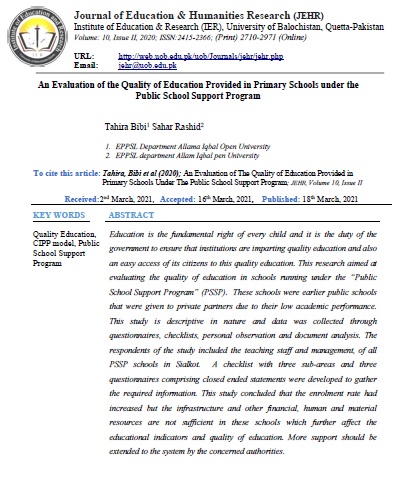An Evaluative Study of Quality of Education in the Public School Support Program
Keywords:
Quality Education, CIPP model, Public School Support ProgramAbstract
Education is the fundamental right of every child and it is the duty of State to ensure that institutions are imparting quality education and also an easy access of its citizens to this quality education. This research aimed at evaluating the quality of education in schools running under the “Public School Support Program” the schools were earlier public schools that were given to private partners due to low performance. The study was descriptive in nature and data was collected through questionnaires, checklists, personal observation and document analysis. The population of the study included all PSSP schools in Sialkot including all licensees, entire teaching staff and management. Checklist with three sub-areas and three questionnaires were developed. Questionnaires contained closed ended statements. The study concluded that enrolment rate has increased but infrastructure and other financial, human and material resources are not sufficient in these schools which further affect the educational indicators and quality of education. More support should be extended to the system by the concerned authorities.
References
Cheong, Y. C. (1997). A Framework of Indicators of Education Quality in Hong Kong Primary Schools: Development and Application.
Cheng, Y. C. (1997). A Framework of Indicators of Education Quality in Hong Kong Primary Schools: Development and Application.
Duraisamy, P. James, E., Lane, J. & Tan, J-P. (1997) Is There a Quantity-Quality Trade-Off as Enrollments Increase?Evidence from Tamil Nadu , India.
Francis, S. (2015) Impact of Enrollment on the Quality of Learning in Primary Schools in Imenti Central District, Kenya.
Eze, S. (2009). Features of Quality Education. Retrieved from http://www.researchgate.net
Motala, S. (2000, March). Education transformation and quality: The South African experience.
Patil, Y., & Kalekar, S. (2015). Cipp Model for School Evaluation. Scholarly Research Journals, 2/10. http://oaji.net/articles/2015/1201-1439207905.pdf
Scheerens, J. (1991) Process indicators of school functioning: A selection based on the research literature on school effectiveness.
Scheerens, J., et al. (2003) Measuring educational quality by means of indicators.
Stufflebeam, D. L. (1971). The relevance of the CIPP evaluation model for educational accountability.
http://cglrc.cgiar.org/icraf/toolkit/The_CIPP_evaluation_model.htm
UNICEF. (2000). Defining Quality in Education. A paper presented by UNICEF at the meeting of the International working group on education. Florence. Italy, June.
Verspoor, A. (2008). Conditions and Factors of Effective Schools in Africa.
Punjab Education Foundation (2018) http://pef.edu.pk.pefsis.edu.pk/adu/qat_result_pssp.aspx
Punjab Education Initiative Management Authority. (2018), https://peima.punjab.gov.pk/Home/About
Punjab Examination Commission: Results. (2018) http://pec.punjab.gov.pk/results




